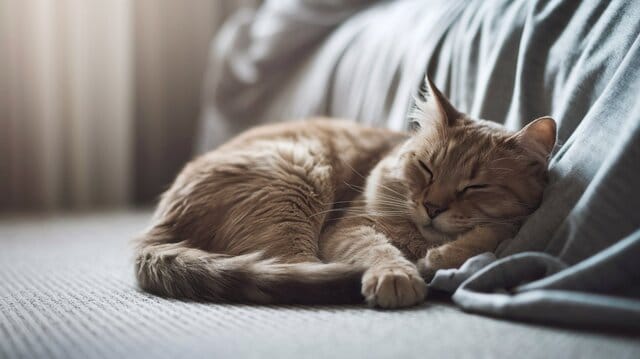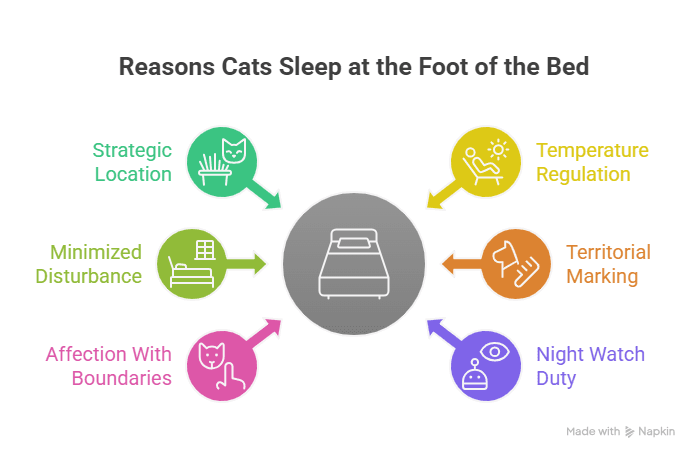
Introduction
It’s nighttime, the lights are off, and you’re just settling into bed. As you stretch out your legs, you feel a familiar, warm weight curl up near your feet. It’s your cat, claiming their usual spot at the foot of the bed.
Whether they appear like clockwork every night or only when it suits them, many cat owners notice that their feline companions prefer the foot of the bed over any other place. But have you ever wondered, Why Do Cats Sleep at the Foot of the Bed?
Why not the pillow, your chest, or curled up under the covers? Why do cats seem so drawn to this one specific part of the bed?
Let’s dive into the world of feline behavior and instincts to find out what your cat is really thinking—and feeling—when they choose that cozy spot by your feet.
The Feline Instinct Behind Sleeping Positions
Before decoding why cats favor the foot of the bed, we have to understand a key truth:
Cats are both predators and prey by nature.
This duality shapes nearly everything they do, including how and where they sleep.
In the wild, cats sleep in elevated or protected spaces that give them:
- Quick exit points
- Clear vantage views of surroundings
- Protection from larger predators or threats
Your domesticated cat may not have to worry about being hunted, but these deep-rooted survival instincts still influence their everyday behavior, including where they nap at night.
So, while your bed may seem safe and familiar, the foot of the bed checks off a lot of feline safety boxes.
Top Reasons Cats Sleep at the Foot of the Bed

Let’s explore the most likely explanations, backed by feline psychology and science, for why cats gravitate to your feet.
🐾 1. Strategic Location for Safety & Escape
Cats love feeling secure, but they also love being in control. The foot of the bed gives them the best of both worlds.
- It’s close enough to you for security
- But also far enough to avoid feeling trapped
- And most importantly, it offers a quick escape route if they hear a noise, feel disturbed, or just decide it’s time to explore
Your head is near the wall. The middle is surrounded. But the foot? That’s the launchpad.
🌡 2. Temperature Regulation
Your cat seeks warmth, but not too much. The foot of the bed allows them to:
- Soak in some of your body heat
- Avoid the “hot zones” like your chest or neck
- Adjust their position based on temperature fluctuations
If they get too warm, it’s easier to hop off from the edge than from the middle.
🛏 3. Minimized Disturbance
Let’s be real—humans toss and turn in their sleep. From a cat’s perspective, being near your:
- Arms (flail zone)
- Head (talking/sleep-breathing zone)
- Torso (movement zone)
…is a gamble.
The foot of the bed is relatively still and quiet, giving your cat a peaceful place to nap without being squished or startled.
🏠 4. Territorial Marking & Ownership
Cats are territorial animals. They often use scent glands in their paws and cheeks to mark their domain. Your bed isn’t just your bed—it’s shared territory in your cat’s mind.
By sleeping at the foot, they’re:
- Claiming part of the space
- Leaving their scent
- Guarding the area (on their terms, of course)
They may even alternate positions depending on which areas they feel more “in control” of.
🤍 5. Affection With Boundaries
Sleeping near you—but not on top of you—strikes the perfect balance for many cats. They get:
- Emotional closeness
- Familiar scent and sound of you
- Personal space (which they value immensely)
If your cat is affectionate but not clingy, this is their way of saying,
“I love you… just not in a smothering kind of way.”
🐱 6. Night Watch Duty
Some cats exhibit protective behavior toward their humans. The foot of the bed gives them a clear line of sight to the door, hallway, or window—whatever they consider part of your shared territory.
They may not be “guarding” you in the traditional dog-like sense, but they are:
- Monitoring movement
- Alert to subtle sounds
- Ready to pounce or investigate if needed
Your cat may be your own furry security system… whether you asked for it or not.
Do Cats Sleep at the Foot of the Bed Because They Love Us?
Short answer: yes—just in a cat-like way.
Cats are often mislabeled as aloof or independent, but studies and real-world behavior tell a different story. When your cat chooses to sleep near you, especially every night, it shows:
- Trust: They feel safe around you
- Bonding: They’ve formed an emotional attachment
- Affection: It’s their version of a nightly cuddle
They may not spoon like a dog or nuzzle like a baby, but that warm curl of fur near your feet? That’s a love letter in cat language.
Why Do Some Cats Sleep Elsewhere?
Not every cat is a foot-of-the-bed sleeper, and that’s okay. Sleep preferences can vary based on:
- Age: Senior cats may avoid beds if they’re hard to access
- Personality: Some cats prefer solitude or elevation (think cat trees, window perches)
- Health: Arthritis, pain, or vision issues may drive them to floor-level options
- Lifestyle: Outdoor cats or night-prowlers may prefer to roam and rest at odd hours
Just because your cat doesn’t sleep near you doesn’t mean they don’t love you—it might simply be a reflection of their comfort zone.
Is It Okay to Let Your Cat Sleep on the Bed?
Absolutely—as long as it works for you and your cat.
✅ Pros:
- Enhances bonding and trust
- Helps anxious cats feel secure
- Makes for cozy winter nights
❌ Cons:
- Sleep disruption (especially with nighttime zoomies)
- Allergies or asthma triggers
- Shedding and hygiene concerns
- Possible litter tracking
If you do allow your cat in bed:
- Wash sheets frequently
- Use a lint roller daily
- Keep litter boxes clean to reduce odor transfer
- Consider a washable blanket at the foot of the bed
What If Your Cat Suddenly Changes Sleeping Spots?
It’s normal for cats to switch things up occasionally. But sudden or drastic changes in sleep behavior may indicate:
- Health issues: arthritis, pain, or discomfort
- Stress: environmental changes, new pets, or loud noises
- Temperature shifts: seasonal changes may drive your cat to warmer/cooler spots
- Conflict: Another cat or pet may have claimed their usual spot
Observe your cat’s behavior for other signs—hiding, vocalizing, changes in appetite—and consult a vet if needed.
How to Encourage (or Discourage) Bedtime Sharing
If you want your cat to sleep near you—or stop sleeping on your bed altogether—consistency is key.
To encourage bedtime cuddles:
- Add a soft blanket or heated pad to the foot of the bed
- Use treats and praise when they settle near your feet
- Avoid sudden movements or noise that might disturb them
To discourage it:
- Provide an appealing alternative (cozy cat bed, warm perch)
- Close the bedroom door at night (consistently)
- Don’t scold—redirect gently with treats or toys
Remember: behavior takes time to adjust. Patience and positive reinforcement go a long way.
FAQs
Why does my cat sleep at the foot of the bed and not near my head?
The foot offers less motion, fewer disturbances, and a quicker exit route. It’s also less intense—many cats prefer subtle proximity over direct contact.
Is my cat protecting me while I sleep?
In a sense, yes. Cats may position themselves to observe doorways or windows, which aligns with protective behavior. It’s likely instinctual rather than intentional “guarding.”
Why does my cat leave the bed halfway through the night?
Cats are crepuscular, most active at dawn and dusk. Your cat might leave for a snack, patrol, or bathroom break, then return or find a new spot.
Also Read - Can Cats Sense Bad Weather? What Your Cat Knows Before You Do
Conclusion
So, why do cats sleep at the foot of the bed? Because it’s the perfect mix of safety, warmth, independence, and affection—all on their terms.
That simple act of curling near your feet says a lot:
- I trust you.
- I want to be close.
- But I also like having my space.
Understanding your cat’s sleeping habits helps you connect more deeply and appreciate those quiet, shared moments when they choose to end their day close to you.
And really, isn’t that the best kind of bedtime company?




